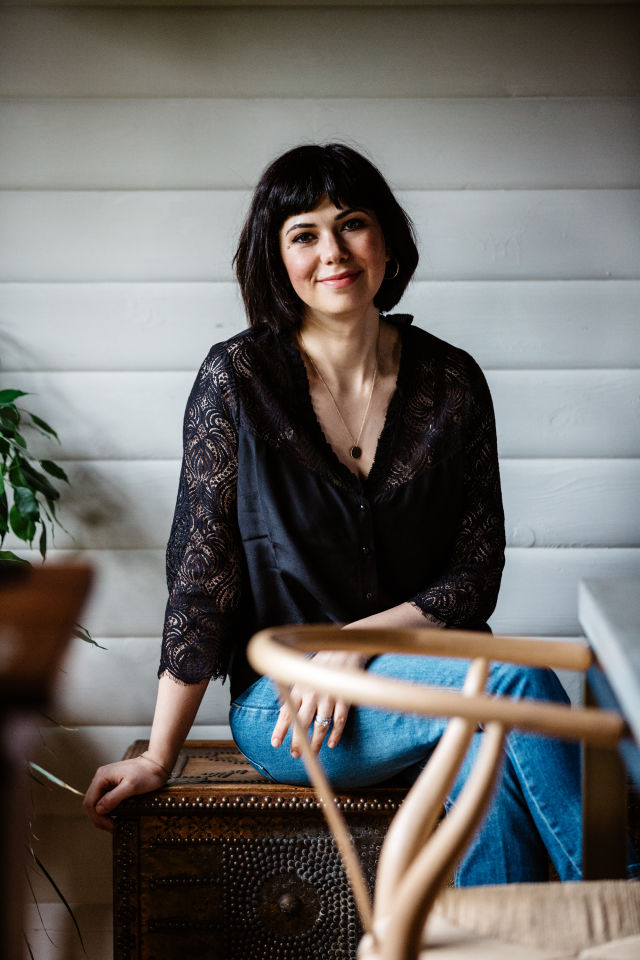Beauty Blogger Julianna Broadwater Talks Clean, Healthy Skin Care

Makeup Counter Culture founder and blogger, Julianna Broadwater, fights for a cleaner beauty industry.
Image: Casey Broadwater
While some people worked as a barista in their undergraduate years, or maybe a seasonal gig at the college bookstore, Julianna Broadwater was a makeup artist at Macy’s. When business was slow, she would skim the product brochures and binders. “I didn't have a smartphone,” she jokes.
As she read, she noticed a pattern: Nearly every list of ingredients included parabens, preservatives meant to extend a product’s shelf life, but often deemed as toxic. Later, when Broadwater moved to Japan in 2006, she noticed that the products there had more natural ingredients, and not nearly as many parabens.
Upon returning to Seattle in 2010, she began to seek out cleaner beauty products. But this was pre-Goop takeover—before the dawn of clean beauty guru Gwyneth Paltrow, who busted onto the natural skin care scene. Frustrated at the lack of reviews and coverage online, she decided to start a blog of her own. On Makeup Counter Culture, she artfully highlights both local and national brands, describing, for instance, a lipstick’s taste, or the feel of an eye tint, (like the perfectly “satin-y” Lid Tint from Jillian Dempsey). She gives tips and tricks for how to create different looks, and she helps you shop, offering a guide to clean brands organized by country and state. For Broadwater, clean beauty means healthy beauty. She fights for a stronger, greener industry—one paraben-free Lid Tint review at a time. —Aly Brady
I first read an article in Vogue. I think they were talking about conventional nail polish and formaldehyde, and how oncologists are telling their patients to stay away from nail polish because some of these ingredients aren't good for you. And that's when I started to really dive into it. The more I researched the more I realized there's a lot of compelling evidence here that draws a link between beauty products and adverse effects on your health.
Clean would mean ingredients that not only aren't going to harm your skin or harm you, but you're not going to be dealing with build up over time in the body.
It’s evolving the concept of beauty to include health; doing good and feeling good. I think people are hungry for a progressive take on beauty.
When I call it makeup counter culture, there's a sort of banishing this sort of ageist, sexist, and really limited scope of what beauty is.
And I think health is beautiful, and beauty should be in part, a celebration of health.
I don't know why it's so slow out here, we’re so far behind other cities. But we've got a shop, it's called Follain in University Village, that was a huge step because now we have a clean beauty outpost where you can walk in and you don't have to worry about reading the ingredients.
And then we also have a couple of brands that are local here that are getting national attention. Kari Gran is one, she's known for her Lip Whips, it's almost like cake-frosting texture with lip-glosses that come in a jar. They're really pretty on and they last forever.
There's another brand that's really big in Seattle called Gressa Skin. Her foundation is a big deal, Gwyneth Paltrow raves about it on Goop. I don't think they're at Sephora yet, but, she's a chemist and she's made a foundation out of broccoli seed oil, and it gives the most flawless finish. I would challenge anyone who loves the Giorgio Armani foundation to give that one a whirl and see if they wouldn't prefer it because it's so good for the skin and it's just beautiful.
I want this industry to succeed and grow. I want there to be point where people don’t have to say “is this paraben free?” That should just be a given.




